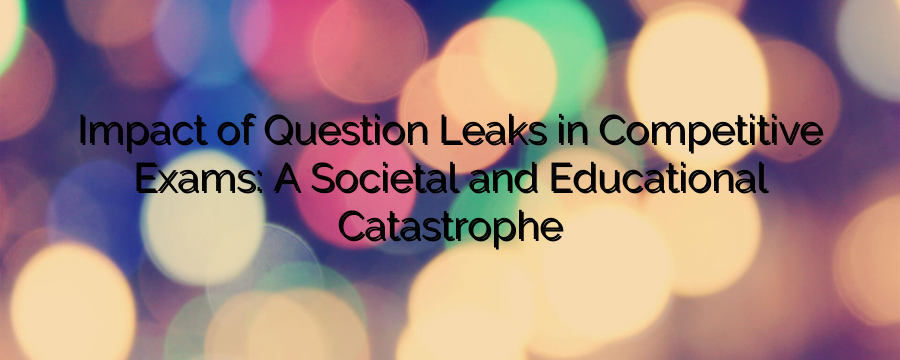The sanctity of competitive examinations has long been regarded as a cornerstone of academic and professional meritocracy. However, the recurrent incidents of question leaks pose a severe threat to this sanctity, undermining the very fabric of fairness and equity that these exams are meant to uphold. This editorial seeks to explore the multifaceted implications of question leaks on society and students, illuminating the profound damage such breaches inflict on our educational and societal structures.
One of the most immediate and detrimental impacts of question leaks is the erosion of trust in the educational system. When students, parents, and educators cannot rely on the integrity of examinations, the foundation of academic assessment is fundamentally compromised. Competitive exams are designed to be a level playing field where merit, preparation, and hard work determine success. Leaks introduce a pernicious element of unfair advantage, skewing results and eroding public confidence in the fairness of the system. This loss of trust is not easily restored and can have long-lasting repercussions on the credibility of educational institutions.
The competitive nature of these exams already places immense pressure on candidates. The knowledge that exams are susceptible to leaks and unfair practices can exacerbate anxiety and stress, leading to a pervasive sense of disillusionment. Students who have worked diligently and honestly may feel betrayed and demotivated, questioning the value of their efforts and the integrity of the achievements of their peers. This can lead to a decline in academic morale, fostering a cynical attitude towards education and hard work.
Question leaks disproportionately benefit those with access to the leaked material, often exacerbating existing socioeconomic inequities. Students from affluent backgrounds who can afford to pay for leaked papers gain an unfair advantage over their less privileged peers. This deepens the divide between the haves and have-nots, perpetuating a cycle of inequality. Competitive exams are often seen as gateways to better opportunities and social mobility; thus, leaks undermine this vital function, entrenching socioeconomic disparities and stifling upward mobility for deserving candidates from marginalized backgrounds.
At its core, the leakage of exam questions is an affront to the principle of meritocracy. In a truly meritocratic society, individuals advance based on their abilities and efforts. When exams are compromised, the value of merit diminishes. This can have far-reaching consequences in professional fields where competence is crucial. For instance, if medical or engineering entrance exams are compromised, it can lead to under qualified individuals entering professions where lives and infrastructure are at stake. This not only endangers public safety but also devalues the profession and its practitioners.
Question leaks are often symptomatic of a broader culture of corruption. The existence of leaks implies that there are individuals and networks willing to compromise ethical standards for financial or personal gain. This fosters a culture where unethical behavior is normalized, and corrupt practices become entrenched. The normalization of such behavior can spill over into other areas of society, perpetuating a vicious cycle of corruption that is difficult to break.
Addressing the issue of question leaks requires a multifaceted approach. Strengthening the security measures surrounding the creation, distribution, and administration of exams is crucial. This includes adopting advanced technological solutions such as encryption and biometric verification to ensure the integrity of the examination process. Additionally, there must be stringent legal consequences for those involved in leaking and distributing exam materials to deter potential wrongdoers.
Furthermore, fostering a culture of integrity within educational institutions is essential. This involves educating students about the value of honesty and the long-term benefits of ethical behavior. Educational reforms that reduce the overemphasis on a single exam and promote continuous assessment can also help alleviate some of the pressures that drive individuals to seek unfair advantages.
In conclusion, question leaks in competitive exams are a grave issue that undermines trust, exacerbates inequities, and compromises the principle of meritocracy. Addressing this problem requires concerted efforts from all stakeholders, including educators, policymakers, and society at large, to restore the integrity of the examination process and uphold the values of fairness and equity in education.
Impact of Question Leaks in Competitive Exams: A Societal and Educational Catastrophe
84
previous post



